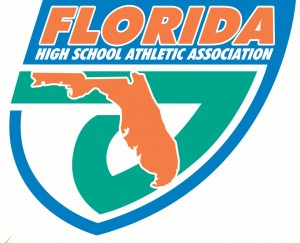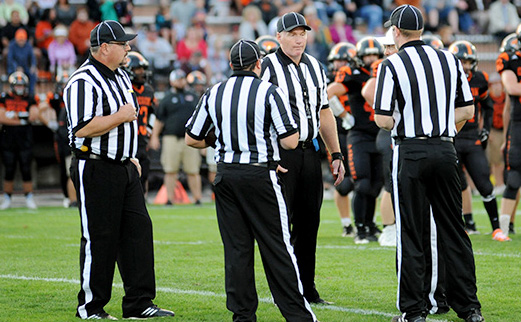Debating home-schooler participation
More states opening the doors to their high school athletic programs
Tim Tebow is one of the most recognized names in sports today. The former University of Florida quarterback has a distinguished résumé that includes two national championships, two first-team All-American honors and a Heisman Trophy. Books and documentaries offer insight into his intriguing life.
But what the average person doesn’t know is that his name has become synonymous with one of the most discussed topics in high school sports today.
Often referred to as the “Tebow bill,” legislative efforts are giving home-schooled students the right to participate in interscholastic activities in their public school districts. Tebow himself was home-schooled but played sports at Nease High School, just outside of Jacksonville, Florida.
According to the Home School Legal Defense Association (HSLDA), a total of 22 states currently allow home-schoolers some type of access to classes or sports. However, these numbers vary depending on where you look, and some states have approved participation only under certain conditions.
For example, in Michigan, the state athletic association allows students of non-traditional schools to participate in public school athletics if the student is taking and passing at least 66 percent of a full-credit load.
The Illinois High School Association requires that student-athletes be enrolled in the public school they represent and take at least 25 credit hours, or five classes.
These requirements are often part of school’s policies and the state high school athletic association’s bylaws. They often require home-schooled students to meet the same eligibility requirements as public school students, as well as academic requirements, which require verification.
Alabama is among the states currently grappling with how it would allow home-schooled students to participate in public school sports. After years of carrying a “no access” policy for home-schoolers, the Alabama High School Athletic Association (AHSAA) is beginning to change its tune on the subject.
“This is being studied, and has been studied for quite some time now,” said Ron Ingram, the AHSAA director of communications.
A bill was proposed in the Alabama State Legislature during this year’s session that would have allowed home-schooled students to participate in public school extracurricular activities. However, the bill did not pass, and now the AHSAA is in the midst of studying options in order to allow home-schooled students to participate without violating basic AHSAA membership rules.
“The AHSAA has now agreed to formulate its own rule upon approval of its membership,” Ingram said. “The goal is to have something in place by 2016-17.”
Wisconsin is another state undergoing change. The state legislature slipped a provision into its biennial budget that allows participation by home-schooled students beginning with the 2015-16 school year. That conflicts with the Wisconsin Interscholastic Athletic Association bylaws, which bar home-schooled students from playing public school sports.
The WIAA and the state’s top home education advocacy group opposed the law, which was proposed by a legislator who home-schools his children. The athletic association plans to rewrite its bylaws to comply with the new mandate.
There are various arguments on both sides of the debate. Those who favor the bill contend that all families pay taxes that fund public schools; therefore they should be given the same opportunities as those who attend public schools.
Others argue that home-schoolers could eventually crowd out public school students, taking spots from kids who actually attend classes at that institution. There’s also fear that it could lead to illegal recruiting tactics, as coaches try to lure the best talent to their programs.
For schools and athletic associations, the biggest obstacle is logistics; how can schools make sure home-schooled students are academically eligible to participate in sports if they’re not the ones administering grades?
According to AHSAA Executive Director Steve Savarese, those issues will be discussed and developed as the association works to get a plan in place.
“The fundamental issue is fair play, and the bill, or the bills, that membership has seen previously have not promoted fair play,” Savarese said during an interview with the Opelika-Auburn News.
While the issue remains an important topic in several states, it is the opposite in Michigan.
John Johnson, the communications director at the Michigan High School Athletic Association (MHSAA), has been with the organization for 28 years. He said there hasn’t been any type of pressure to allow access to home-schooled students in nearly 20 years.
“We did go through a period back in the ’90s, where there was a serious push, but the scene around here is quiet as far as there being any type of a ground swell for change,” he said. “However, if schools felt that change is necessary, there’s always a process they can take, but that takes time.”
Johnson points out that many home-school organizations provide outside opportunities for those who wish to participate in athletics. The Michigan Home School Sports Association provides home-school students a chance to participate on athletic teams and in events all over the state. According to the association’s website, there are 29 different home-school athletic programs across Michigan.
“They are able to play other small schools that sometimes couldn’t maybe field a JV or varsity team,” said Johnson, who went through the home-school process himself as a parent. “People who engage in that have found the competition to be a neat thing.
“They can play national tournaments and do some things that regular public schools in the MHSAA can’t even do. You have to balance it out.”
Even if more public schools across the nation did begin opening their doors to home-schooled students, it’s difficult to tell how many would take advantage of the opportunity.
According to the HSLDA, only 3 to 5 percent of home-schooled students actually participate in public school sports in states where it’s allowed.
According to statistics from the official website of Alabama’s Tim Tebow Bill, there are an estimated 50,000 home-educated K-12 students in Florida and only 315 home-schooled students participated in the state’s public school athletic programs last year.
It remains to be seen whether those statistics will matter when the topic comes up for debate in other states. For some, it’s all about fairness.
“The bottom line is that every student, home-school or not, meets the exact same eligibility standard,” Johnson said. “That’s what our schools right now seem to prefer, but it’s in their hands if they would wish to see change.”






